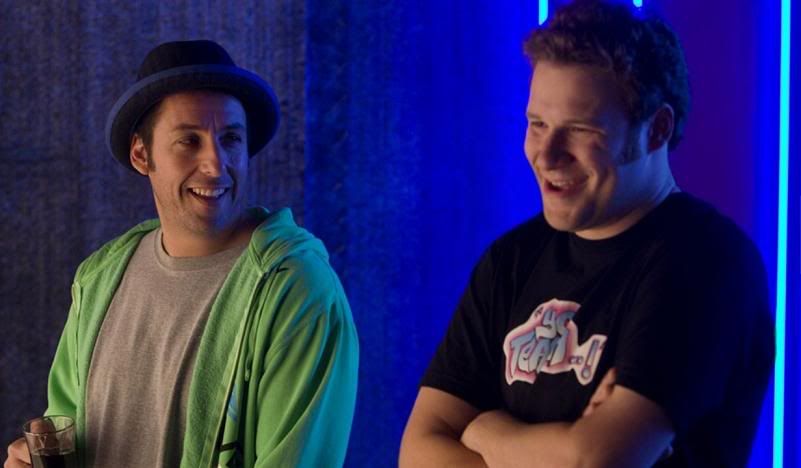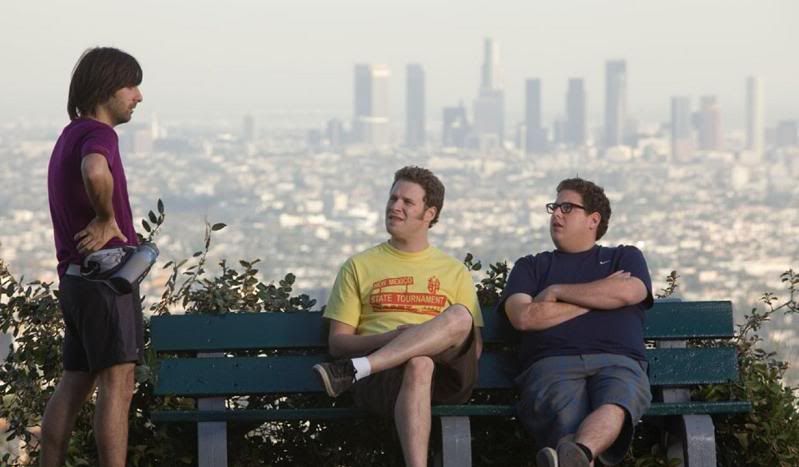
At this point in Judd Apatow's career, after three films as a writer-director and numerous other projects in which he's had varying input, it's obvious that, if nothing else, he has ambition and ideas far beyond just pumping out an endless stream of mainstream "dude" comedies with lots of penis jokes. Of course, that's what the Apatow comedy factory is known for, and certainly not without ample justification, don't get me wrong. But his films also have heart, and even sometimes soul. He's clearly interested in the thematic implications of his stories, and in the emotional arcs of his characters. His films are seldom just the raucous, foul-mouthed buddy comedies they're unfailingly advertised as, although none until now have been quite as challenging or unusual as his latest film, the Adam Sandler/Seth Rogen vehicle Funny People. None of this should suggest, though, that, ambition and heart aside, Apatow's films are entirely successful. Just because he has ambition doesn't mean he fulfills it onscreen. In fact, in three directorial features thus far, Apatow has still not made a truly great film, nor even a film that's good all the way through. What he does well seems to come only sporadically, mixed in with liberal doses of what he consistently manages to screw up: his incomprehension of female characters, his uneven sense of pacing, his increasing tendency towards bloat and excess (I breathlessly await his five-hour Michael Cera-starring awkward romance comedy). Funny People, his third feature, displays all these conflicting tendencies. In many ways it is his best movie yet, his most mature and smart, and yet it is also his most uneven and frustrating.
It's certainly his most serious movie yet, if only because of its subject. George Simmons (Sandler) is a popular comedian and movie star — with a string of very Sandler-esque awful hit movies behind him — who discovers that he is dying of a terminal disease, taking an experimental medication with only an 8% chance of helping him. After receiving this news, he goes back home to his tremendous and stuff-crammed house and watches images of himself on a wall of TV monitors: there are images from his goofy and ridiculous movies, but the images that touch him are the ones of him as a young, awkward, nervous comedian. In an attempt to recapture this lost youth, he begins returning to comedy clubs, doing stand-up again. He befriends the struggling young comic Ira (Rogen) and abruptly offers the younger man a job as his assistant, writing jokes for him, opening for him on tours, and generally just hanging out with him. George is a typical lonely, successful man, a man who feels that he has to pay everyone just to be around him — at one point, a band he's jamming with interrupts a song to quietly tell him they're into overtime now.
Of course, anyone who's seen this kind of movie knows that George's time with Ira will reawaken him to the pleasures of life when he was younger, the things he's lost track of with fame and fortune. Apatow's themes tend to be along well-traveled lines like this, but he treats these familiar emotions with such sincerity, such warmth, that it's affecting anyway. Sandler certainly helps, turning in the kind of sensitive, multi-layered performance that anyone who saw Paul Thomas Anderson's Punch-Drunk Love has known the comic was capable of. His ashen, deadened reaction to his confrontation with mortality is completely realistic, as is his habit of softening the blow with laughter. One of the best scenes in this respect is one in which a German doctor (Torsten Voges) with a voice like Werner Herzog tells George that he's dying and things are looking bad. George and Ira take the news silently, looking blankly back at the man, but they then dissipate the tension by mocking the doctor's accent, pushing off one another until they've both nearly forgotten the devastating news.
Scenes like this aren't exactly funny, but they're amusing and believable for the characters. Actually, the film is seldom just funny for its own sake: it's funny when the characters are funny, and just as often it elicits bittersweet smiles rather than outright laughter. It's a surprisingly low-key comedy, one in which the humor arises organically from long scenes of awkward pauses and uneasy banter, when a stray line will suddenly sparkle with the verve of great humor. It's no coincidence that the process of writing jokes is central to the film, that Apatow shifts fluidly between bullshit sessions in which George and Ira, or Ira and his friend Leo (Jonah Hill), will trade lines, and scenes of actual stand-up routines in which the jokes play off of live audiences. The humor is constantly in flux, constantly being polished and refined right there within the film. Perhaps the funniest moment in the whole film, though, is a cameo appearance in which Eminem asks Ray Romano if he wants to fuck, much to the chagrin of the man everyone's supposed to love. But it's telling that Slim Shady also dispenses some heartfelt words about fame, second chances and what to do with one's life. Fart and cock jokes aside, few things in this film are there only for the laughs; Apatow is purposefully working towards an examination of how the selfish, immature guys who are often the subjects of his movies can turn their lives around and learn to stop hurting those around them.

So that's the good stuff. Sandler and Rogen are great, turning in substantial performances, both funny and moving. It's also interesting to see an Apatow film in which, in contrast to the infantile wish fulfillment of Knocked Up and The 40 Year Old Virgin, his self-absorbed male character has to realize that he actually isn't the best thing for the girl he loves, that his second chance does not include a second chance with her. Ah, her. No one who's written about this film has been able to resist commenting on the utter misguidedness of the film's late detour into a romance between George and his "one who got away," Laura (Apatow's wife Leslie Mann). It truly is baffling. The film is at its best when it's a formless, nearly plotless, meandering exploration of the stand-up comedy milieu, peppered with cameos by a lot of comedians who are no longer in the public eye very much (including Paul Reiser, a typically abrasive Norm MacDonald, and Andy Dick amiably sending up his own persona). But at some point in this sprawling epic, Apatow decided he needed a more conventional plot, and so he has George and Ira go to visit Laura, who's now married to Clarke (Eric Bana), with whom she has two kids (played by Apatow and Mann's own young daughters). She's still mad at George for his habitual cheating on her twelve years earlier, which ended their relationship, though now she finds herself in the same position with her philandering businessman husband.
Quite simply, the film goes off the rails at this point. Mann is a decent comedic actress, but she just can't sell her character's enduring love for George, and the scene where she breaks down and expresses her love to him after all these years apart is just embarrassing. Worse, Apatow drags this extended sequence on and on and on... and on and on some more. There are countless outs, countless points where it seems like it's about to end, and then it just doesn't. It's seemingly endless, to the point that the film just stops dead, and all of the earlier threads are more or less dropped in favor of some tired drama cycling around Laura's marriage and children. Apatow loses track of important characters, especially Ira's entertaining friends Leo and Mark (Jason Schwartzman), as well as Ira's infatuation with a young comic named Daisy (Aubrey Plaza). This loose-limbed, unpredictable film at some point settles down into a trite romantic comedy, then a romantic drama, before the denouement finally (and belatedly) makes something interesting of George's romantic obsessions and the way he's blowing his second chance to make something substantial of his life.
All of this might not have been so unbearable if there was any sense that Apatow knows how to write a convincing female character, or that he really cares what the women in his films are thinking. But his script puts his poor wife through a thankless series of reversals and unbelievable emotions, asking her to construct a character out of a set of contradictory and inconsistent actions. There's nothing she could've done to make Laura, as written, an actual living, breathing person rather than a walking plot device to reflect George's maturation, or lack thereof. It's similarly apparent that Apatow has no idea how to make Daisy a vibrant, fully developed character on a par with the guys. Instead, he just has her tell vagina jokes to match the penis jokes of the men (Sarah Silverman, in a cameo as herself, does the same). For a film that is frequently so funny and real and moving, it's a shame that Apatow keeps sabotaging himself, shifting away from his strong points into maudlin, unconvincing romance. Funny People is not the great film that one senses Apatow may have in him someday, if he continues along his own path to maturity. It is, however, an interesting film, a daring attempt at a comedy that just isn't all that funny. As an experiment, it has to be considered a failed one, but there's enough substance and wit and real feeling here to make it worth seeing anyway.








0Awesome Comments!